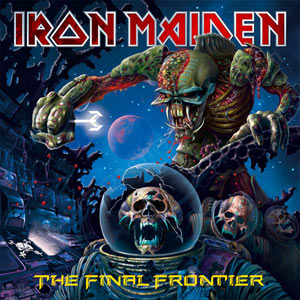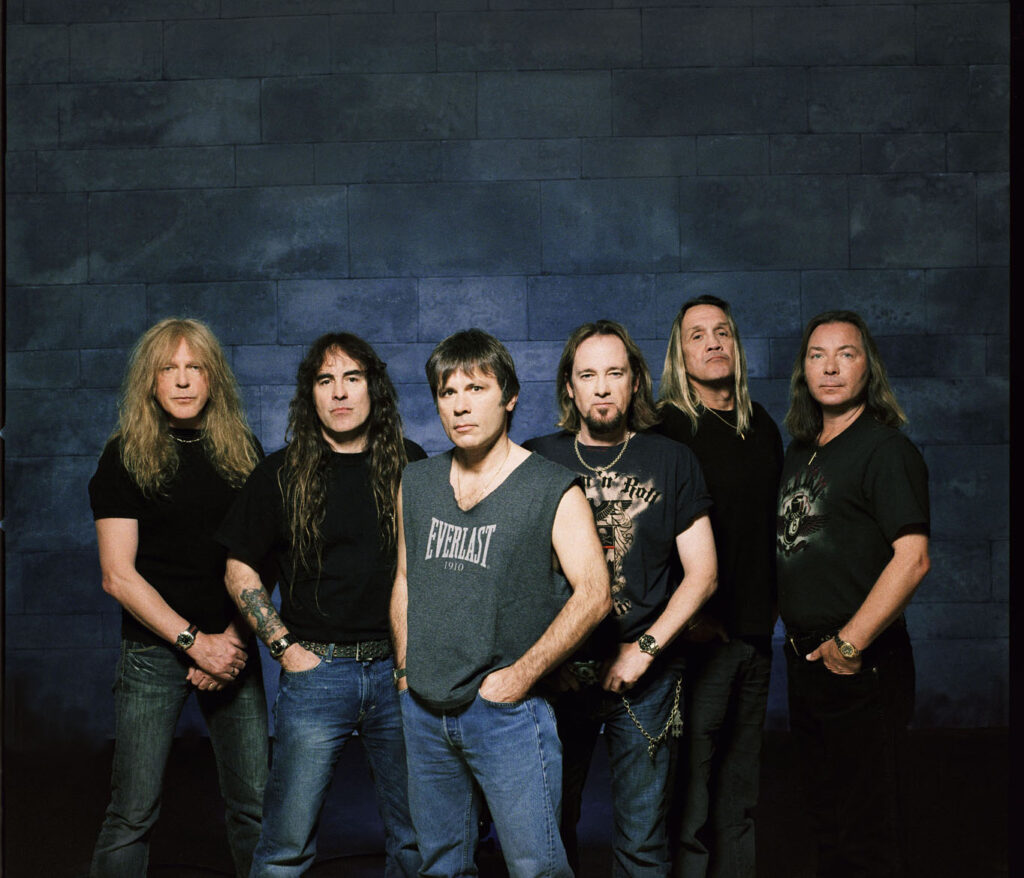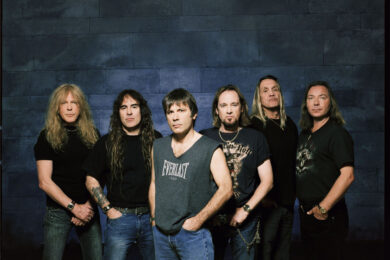Satellite 15… The Final Frontier
The Irons’ 15th album begins with a palette cleanser of sorts. With a heavily phased bass and comprehensively treated drum tattoo, which sounds like a cyber Burundi rhythm beamed back through time from a future tribal society, psychedelic guitar awash with lysergic effects, this is perhaps the most ‘modern’ (or at least different) intro to an Iron Maiden album since… well… ever. ‘Satellites’ is packed with the kind of atmospherics that shout out ‘If you’ve got three guitarists and one bassist, you might as well make the most of them’. This exploratory music serves to set the tone for Bruce Dickinson’s lyrical conceit which sets the tone for the whole album. He puts himself in the position of a future astronaut right at the boundaries of space and expecting imminent death: “I tried to call the earth’s command/ Desperation in the voice/ I’m drifting way off course now/ Leaving little choice/ the luminescence is hard to bear/ I try to calm the fear/ before contact is made with…” For a band who have made their name by conducting an amazing three decade long balancing act between progressiveness, accessibility and heaviness, it’s genuinely exciting to hear them open an album with what is ostensibly a one note, monolithic riff pushed through loads of weird effects that lasts for nearly five minutes. When the song itself kicks in Bruce’s troubled, deep space voyager is prepared for death but the long time fan should be prepared for joy as they launch into a ‘galloping’ (the first and last use of that word today) Imperial late 80s Maiden riff.
El Dorado
Another sign of a modern sensibility was IM’s decision to give away their first single as a free download. It’s always more pleasant to see a huge metal band adapting comfortably to change than revealing themselves to be cluelessly out of touch like Metallica’s dealings with the internet have made them look in the past. The riff is a chugging bruiser that stands in exact opposition to the unexpected atmospherics of the opening track and acts more of a ringer to throw people off the scent as it doesn’t really sum up the album as a whole. It was an early sign that unfortunately we weren’t dealing with a concept album about horror in outer space… like a NWOBHM take on Event Horizon. Instead, the concept, if there is one, appears to be about people at the extreme edges of their known universe. The lyrics take the concept of the mythical Amazonian city and use them as a metaphor for the current global economic downturn. Kevin Shirley’s sensitive production creates a lot of space for the many dense layers of sound to breath and Steve Harris’s cable taut bass lines can be heard thundering along, like the album’s heartbeat.
Mother Of Mercy
A mid paced, reflective song, capturing the Irons in contemplative mood. The gentle jangle of unplugged guitars eventually give way to a dark, gothic chord progression. The frontier being crossed in this song is the one that awaits all living things. Dicko takes on the persona of dying soldier talking to a nun about his life and philosophy in an unnamed field hospital as he takes his dying breaths. The band returned to Compass Point Studios in Nassau, Bahamas, where they recorded Powerslave and Somewhere In Time, and while this has helped them capture a classic imperial Maiden sound, none of the sunny vibes of the Windward Isles have crept onto this disc.
Coming Home
A descending staccato pattern is played in unison by Dave Murray, Janick Gers and Adrian Smith. The riff is stadium hair metal in the extreme and sounds like Maiden completing the circle by borrowing influence of Gn’R. This could be read as another meditation on death but with the more beautiful analogy of a pilot seeing the runway lights through the clouds after a long journey. While popular perceptions of Maiden perhaps see them reaching their critical and commercial peak in the mid to late 80s, fans will know that while their pulling power as a live band never really went away, their artistic rejuvenation (which began in 1999 when Dicko rejoined as singer taking over from Blaze Bayley) really began to climb steeply like the band’s 747 jet Ed Force One just after take-off with the release of their 13th album Dance Of Death and really hitting paydirt with A Matter Of Life And Death in 2006. This cements their position yet again, with the release of the most complex, challenging and rewarding album since Somewhere In Time.
The Alchemist
At a mere 4.30 minutes long, this is their blink and you’ll miss it, grindcore track. The alchemist’s job was to take base material and turn it into gold and this is what Maiden have achieved over the years with their self-taught, self-invented brand of thunderous, mainstream punk (and initially glam and doom as well) and heavy rock and metal, refining it into something that is almost virtuoso and much closer to out and out prog than most people will give them credit for. To do this and to sell 70 million albums into the bargain is to create gold. There is a fine example here of the sterling fretwork we’ve come to expect from the Irons with a stuttering solo that ebbs and flows against the rhythm.

Isle Of Avalon
While it would be wrong to necessarily presume that Maiden were right wing (Eddie the Head was murdering Thatcher in the same period that everyone one from Lemmy to Paul Weller was voting Conservative) they’ve always had an unshakable national pride in a period when it’s not exactly a popular sentiment to espouse. While going on stage to Churchill’s “fight them on the beaches” speech, is first and foremost a way of psyching the crowds and the band before the ‘battle’ of the gig takes place, there’s no doubting the sincerity of songs such as ‘These Colours Do Not Run’. This standout track is based round a riff that has echoes of the breakdown of ‘The Rime Of The Ancient Mariner’. A zippy, zinging solo skates across the surface of the song before breaking through the ice and slowly sinking into a rigid and deep heavy blues rock work out.
Starblind
On one listen, this isn’t an immediately arresting track starting off mid-paced, almost like a power ballad before breaking into a lolloping Thin Lizzy-esque groove. It has a fist pumping anthemic feel and will probably work well live. It breaks down brilliantly into a blues riff that resolves itself in a way that is reminiscent of Piece Of Mind era Maiden. The lyrics return yet again to the Boys Own caper of space travel. After the more serious approach of A Matter Of Life And Death the subject matter appears to be lighter and more fun, even if the actual substance of the songs all appear to be about ageing (of the individuals and the band as a whole).
The Talisman
Most normal bands would have packed up and gone home by this point, but then Iron Maiden aren’t most normal bands and their dogged insistence on making their 15th album their longest to date at nearly 77 minutes long, shows admirably levels of self-determinacy and partially explains perhaps their longevity. Another final voyage is being undertaken in this song, this time by a sailor, setting off for the last time. In such a solipsistic narrative which contains such levels of soul searching, it’s not unreasonable to ask ‘Is this their last album?’ But this being Maiden, they tell you to put such trifling matters out of your mind and instead enjoy the mighty fucking riff that they’ve just deployed! In a lot of ways this is a lot less experimental than A Matter Of Life And Death with its nods to bands like Led Zeppelin etc. Instead this is a much tighter focussed band acting as pure concentrate, with this song being like ‘Run To The Hills’ distilled down to its core ingredients.

The Man Who Would Be King
An epic with synthesized strings that features a very dense and hard to unravel three way guitar solo. Again, the song is about a man “who makes his peace with God” and reflects on his life just as it is ending. For all that the mainstream media like sneering at the perceived Dungeons & Dragons element of classic metal, they make the mistake of lumping bands like Maiden and Blind Guardian or Cradle Of Filth together. Maiden, it should go without saying, are a much more down to earth band, metaphorically speaking at least, which is what gives them such a massive resonance worldwide.
When The Wind Blows
Opens, in true Spinal Tap style, with blowing wind and, more ominously, what appears to be a traditional sounding UK folk style introduction and even when the main riff appears, this only serves to take it into Celtic metal waters. It’s important that an album that turns its glare inwards for so long, should end on a relatively positive note. Because during this song, even though the world is ending in apocalypse, Dicko (who is in fine voice here it must be said) has hope “now the days of our ending have begun”. They carry on with the UK-centric sonic theme the album has with a breakdown worthy of Jethro Tull and their pastoral, vagabond prog. There’s a bitter sweet pay off line at the end of the song… the young lovers who take their lives with a cocktail of poison after mistaking an earthquake for a nuclear blast are obviously meant to remind us of Romeo and Juliet.



